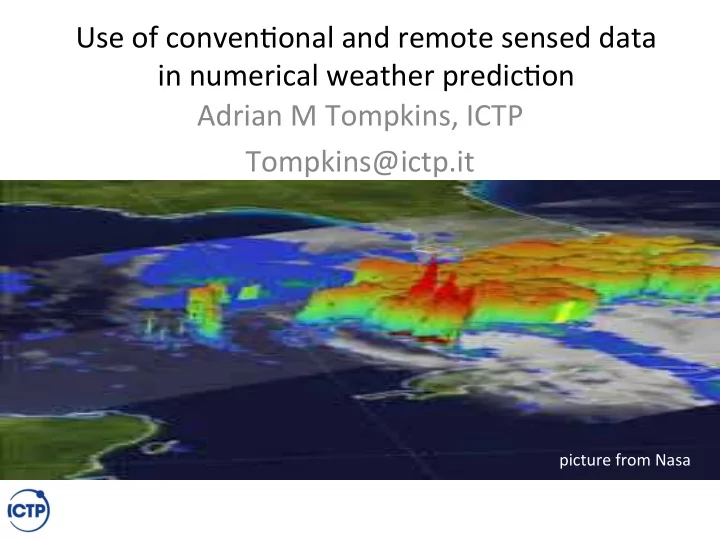

Use of conven*onal and remote sensed data in numerical weather predic*on Adrian M Tompkins, ICTP Tompkins@ictp.it picture from Nasa
Climate impacts on society – Climate impacts are mul*faceted and can occur over many *mescales • Severe weather: floods, droughts • Impacts on health: – Vector borne diseases – Heat stress – parasites – Food security • Infrastructure, economy, sea level rise... – But how can we get climate data for the present day?
Surface measurements • 10 meter windspeed (other levels may be sampled) • 2 meter dry bulb and dew point temperature • Radia*on measurements (op*onal) • Cloud cover (op*onal) • Surface evapora*on • Rainfall • Surface pressure Which of these are used to ini*ate weather forecasts?
Surface synop*c (synop) measurements • High temporal resolu*on • good in situ informa*on • but not relevant for nearby loca*ons (horizontally or ver*cally!)
Sources of data: sta*ons
Yesterday: 00 UTC When and when are the observations the most dense and why?
Sunday: 12 UTC When and when are the observations the most dense and why?
������������������������������������������ ����������������������� �������������������� ������� ���������������������� ����������������������� �������������������� ������������������������ ��������������� � � �
�������������� �������������������� ������������� �������� ����� � �
For Satellite – coverage can be less of an issue (polar or geosta*onary – resolu*on, swathe, return *mes) � �
���������������������������������������� Satellite – advantages and disadvantages ���������������������������������� �������������������� ������������������� ������������������ �������������������� ���������������������� ����������� ��������������� ��������������������� ������������������������� ���������������������� ��������������� ����������������������� ������������������ ���������������������� �������������� ���� ����������������� ���������������������� ��������� � �
But some variables in contrast are difficult to get directly from Satellite • Surface temperature: reliable over oceans using microwave. Some products over land, but uncertainty is large and not available daily • Winds: reasonable over oceans using scaXerometer data, surface winds over lands not possible. Upper level winds from feature tracking (cloud, humidity) but uncertain*es high. • Humidity: near surface only indirectly. • Take home message: most (near) surface variables over land very difficult to infer from remote sensing
������������������ ���������������������� ���������������������� ��������������������� ��������� ���������������������������� ������������������� ������������������������� ����������������������� ������������������� ������������������������� ��������������
Upper air in situ obs Pilot balloon soundings
Radiosounding RS41 Vaisala
���������������������������������������������� � �
Other measurement types • Radar : rainfall, clouds, winds, fallspeeds. • Lidar: cloud base/top height, aerosol loadings, air quality • GPS: water vapour profiles • Microwave sounders: water vapour profiles
����������������������������� ���������������������������������� � �
A supplement source of climate informa*on: analysis and reanalysis • To make forecasts of the future weather, knowledge of the present state is required • This “picture” of the atmosphere needs to be “balanced” – Simple spa*al and temporal interpola*on of observa*ons doesn’t work • Hence the development of analysis systems
��������������������������������� � ����������������������������������������������������� ������������������� � ���������������������������������������� � ������������������������������������������������� � �������������������������������������������� � ���������������������������������������������� ������������������������������������������������� ������������������������ � ������������ � �
������������������ � ������������������� ������������������� �������� ����������������������� ��� ������������� ������ � ������������������ ����������������������� ��� � ������� ��� ��� ��� �� ��� ���������� ����� ��� � ������� ��� ��������� � �
Recommend
More recommend